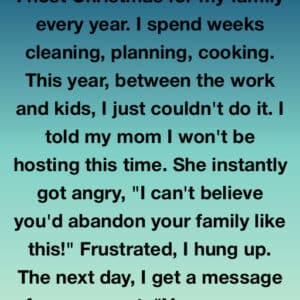The Choice I Can’t Undo, and the Second Chance I Never Expected
Four days before the vacation we had saved for over three years, everything changed. My stepson, Lir, just fifteen, was killed in a car accident. He was sharp, stubborn, quick to laugh, and he called me “Dree” like it was our own secret language.
I should have stayed. But I didn’t.
I packed my suitcase instead.
“You can stay,” I told my husband. “But I’ve worked too hard for this trip to walk away now.”
He didn’t argue. He flew to California to help his ex-wife. And I boarded a cruise ship in a fog, moving through crowds and music like I wasn’t really there.
On the third night, my phone rang. Wind on the line. His voice hollow.
“You will regret this for the rest of your life.”
He told me about every task he had handled alone—the clothing, the service, the urn. And then, softer:
“I don’t even blame you anymore. I think you’re exactly who I thought you were. I just didn’t want to see it.”
Then the call ended.
I finished the trip like a ghost. When we docked, I didn’t go home. I checked into a cheap motel off the freeway and sat in the dark for two days.
A text came:
“I’m moving out. I’ll get my things when you’re not there.”
Losing my stepson turned into losing my husband. And maybe, I thought, that was the consequence I deserved.
Weeks faded into routine—work, sleep, silence. People said I’m so sorry like it was medicine. It wasn’t.
Then one afternoon, his mother—Rania—asked to meet.
We sat across from each other in a quiet café. She placed a photo of Lir at eight on the table. Hair too long. Grin too wide.
“My grief counselor says the mind rewrites memories to survive,” she said. “But sometimes I remember the exact things. The real things.”
She pressed her hand to the picture.
“He told me you were good to him. That last night, he said he wanted dinner with both of you next week. His idea.”
I couldn’t speak.
“And he knew about the cruise,” she continued. “He said he was glad you were finally doing something for yourselves. He didn’t want to be a burden.”
I broke—hands over my face, tears that felt like they came from somewhere ancient. Her words didn’t erase what I had done. But they loosened something. I wasn’t a villain drawn in one bold line.
I went to see my husband. He looked older, thinner. Grief had reshaped him.
“I didn’t know how to show up for pain I didn’t feel I had the right to claim,” I said. “He wasn’t my son. I thought stepping away was gentler. The cruise felt like the only thing I could control. I was wrong.”
He sat on the front step beside me.
“You always thought love meant staying out of the way,” he said. “But love needs you *in* the way.”
We didn’t move back in together. Not then. But we began again.
Slow dinners. Shared therapy. Spaces where silence held meaning instead of distance.
We laughed sometimes—quietly—remembering Lir singing off-key in the shower, arguing with horror movies, pretending he didn’t hear us and then responding anyway.
Nearly a year later, my husband handed me a small box. Inside, a tiny silver wave charm.
“For the one thing we got wrong,” he said. “And everything we might get right from here.”
We volunteer now twice a month with a support group for families grieving the loss of a child. I sit with mothers, step-parents, siblings—and I say the words I once needed:
“Your grief counts. Even if your title feels small.”
If I could go back, I would stay. Not because staying would have changed anything—but because presence matters more than correctness.
Sometimes love isn’t graceful. Sometimes love is simply not leaving.
If you are standing on the edge of a hard moment and every part of you wants to run—stay. Sit. Be there.
It will matter more than you think.





